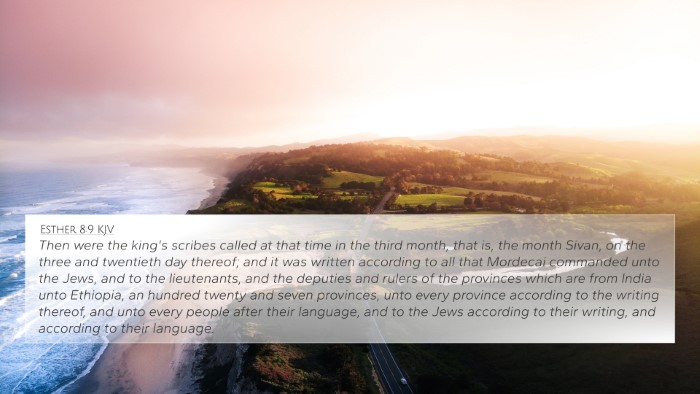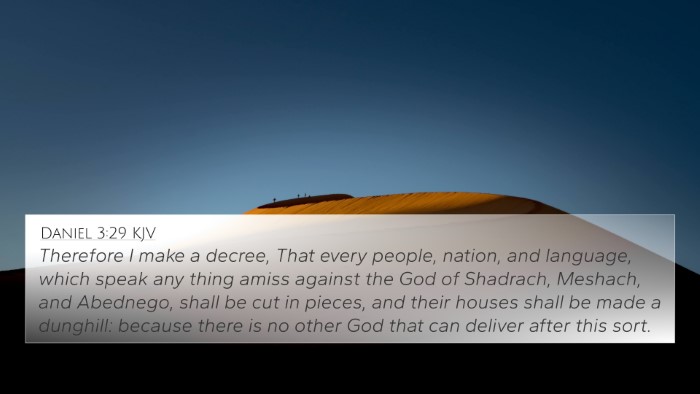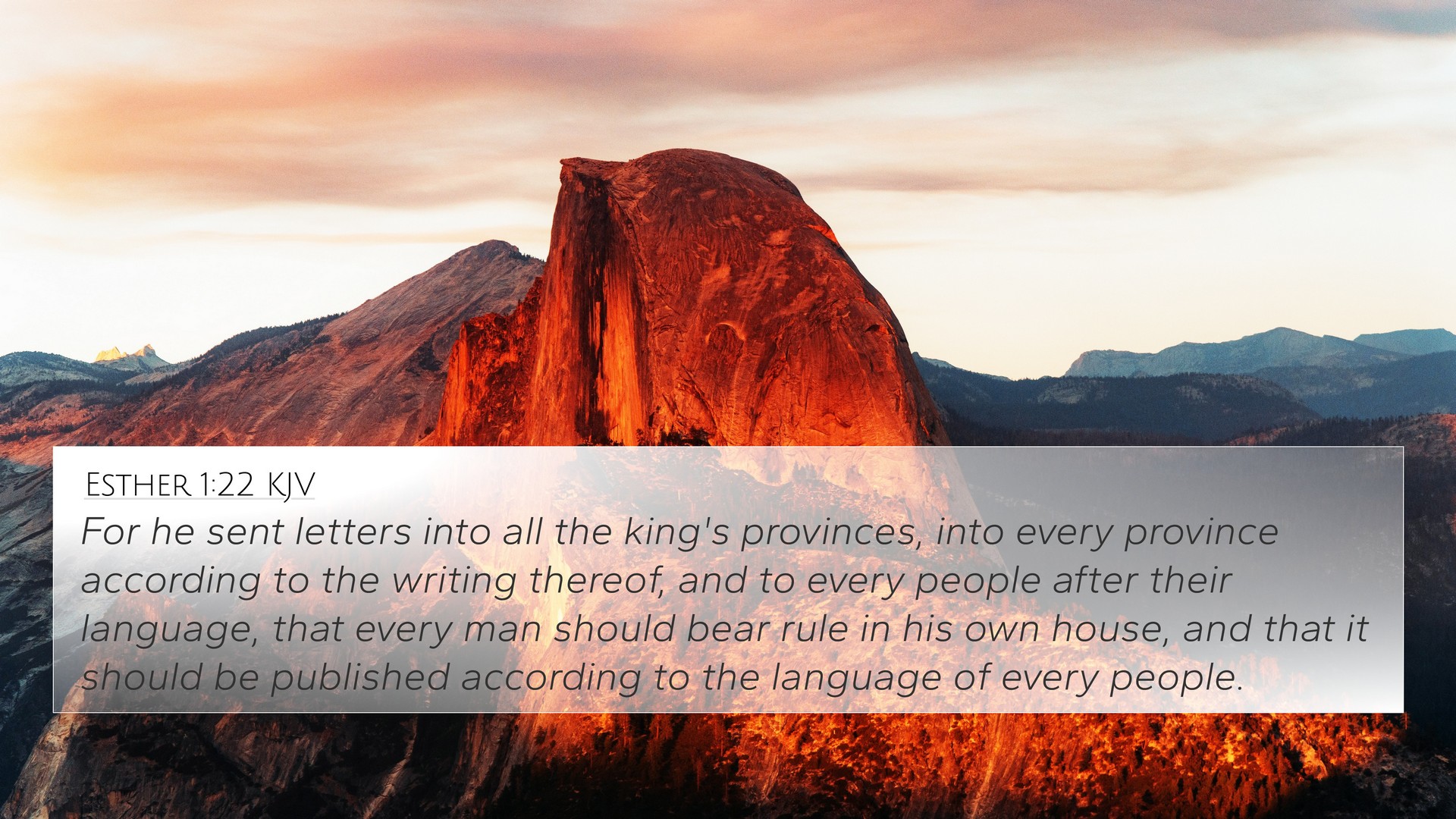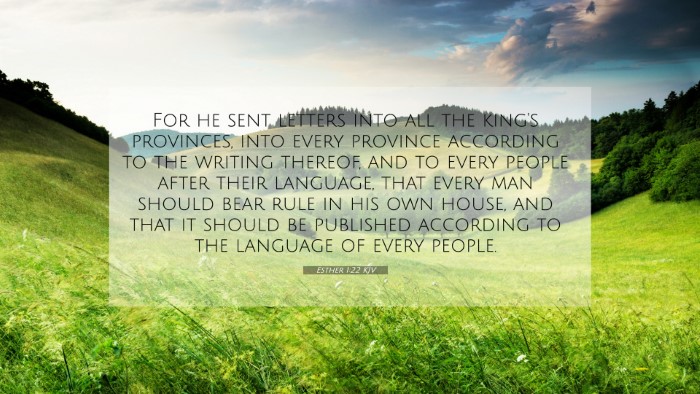Old Testament
Genesis Exodus Leviticus Numbers Deuteronomy Joshua Judges Ruth 1 Samuel 2 Samuel 1 Kings 2 Kings 1 Chronicles 2 Chronicles Ezra Nehemiah Esther Job Psalms Proverbs Ecclesiastes Song of Solomon Isaiah Jeremiah Lamentations Ezekiel Daniel Hosea Joel Amos Obadiah Jonah Micah Nahum Habakkuk Zephaniah Haggai Zechariah MalachiEsther 1:22 Similar Verses
Esther 1:22 Cross References
For he sent letters into all the king's provinces, into every province according to the writing thereof, and to every people after their language, that every man should bear rule in his own house, and that it should be published according to the language of every people.
Uncover the Rich Themes and Topics of This Bible Verse
Listed below are the Bible themes associated with Esther 1:22. We invite you to explore each theme to gain deeper insights into the Scriptures.
Esther 1:22 Cross Reference Verses
This section features a detailed cross-reference designed to enrich your understanding of the Scriptures. Below, you will find carefully selected verses that echo the themes and teachings related to Esther 1:22 KJV. Click on any image to explore detailed analyses of related Bible verses and uncover deeper theological insights.

Esther 3:12 (KJV) »
Then were the king's scribes called on the thirteenth day of the first month, and there was written according to all that Haman had commanded unto the king's lieutenants, and to the governors that were over every province, and to the rulers of every people of every province according to the writing thereof, and to every people after their language; in the name of king Ahasuerus was it written, and sealed with the king's ring.

Esther 8:9 (KJV) »
Then were the king's scribes called at that time in the third month, that is, the month Sivan, on the three and twentieth day thereof; and it was written according to all that Mordecai commanded unto the Jews, and to the lieutenants, and the deputies and rulers of the provinces which are from India unto Ethiopia, an hundred twenty and seven provinces, unto every province according to the writing thereof, and unto every people after their language, and to the Jews according to their writing, and according to their language.

1 Timothy 2:12 (KJV) »
But I suffer not a woman to teach, nor to usurp authority over the man, but to be in silence.

1 Corinthians 14:19 (KJV) »
Yet in the church I had rather speak five words with my understanding, that by my voice I might teach others also, than ten thousand words in an unknown tongue.

Acts 2:5 (KJV) »
And there were dwelling at Jerusalem Jews, devout men, out of every nation under heaven.

Luke 16:8 (KJV) »
And the lord commended the unjust steward, because he had done wisely: for the children of this world are in their generation wiser than the children of light.

Daniel 3:29 (KJV) »
Therefore I make a decree, That every people, nation, and language, which speak any thing amiss against the God of Shadrach, Meshach, and Abednego, shall be cut in pieces, and their houses shall be made a dunghill: because there is no other God that can deliver after this sort.

Daniel 4:1 (KJV) »
Nebuchadnezzar the king, unto all people, nations, and languages, that dwell in all the earth; Peace be multiplied unto you.

Titus 2:4 (KJV) »
That they may teach the young women to be sober, to love their husbands, to love their children,
Esther 1:22 Verse Analysis and Similar Verses
Bible Verse: Esther 1:22
In Esther 1:22, we find a directive issued by King Ahasuerus that enhances our understanding of social order and the importance of obedience in a royal court. The King commanded that letters be sent to all provinces with clear instructions, emphasizing a societal framework that aligns with the values of authority and respect.
Summary of Meaning: This verse highlights the exercise of royal power and the significance of written commands in establishing law and order. The King's message was to ensure that the behavior and customs within his realm maintained the dignity that was expected, particularly in relation to the treatment of women and the patriarchal structure of society at that time.
Insights from Commentaries:
- Matthew Henry: Henry notes that Ahasuerus’s decree was a means to address the misbehavior that arose from the previous events during the banquet. It served not only as a correction to Queen Vashti's defiance but also aimed to establish respect for husbands throughout the kingdom, thus reinforcing family and societal structures.
- Albert Barnes: Barnes interprets the King's edict as significant in promoting obedience and upholding social standards. He suggests that the King was interested in preserving authority over domestic affairs and deterring rebellion, as Vashti's actions had the potential to encourage other women to act similarly.
- Adam Clarke: Clarke emphasizes the importance of communication in governance. He explains that letters were not just means of sending orders but were also a means of ensuring that subjects understood their responsibilities and the expectations of their leaders, highlighting that this command served multiple purposes: legal, social, and moral.
Connections between Bible Verses:
- 1 Peter 3:1-2: Relates to the theme of the relationship between husbands and wives, reinforcing the behavior expected of women.
- Ephesians 5:22-24: Discusses submission and roles within marriage, echoing the royal command's focus on obedience.
- Proverbs 31:10-31: Celebrates the virtuous woman, which contrasts with the actions of Vashti and aligns with the qualities the King desired to promote.
- Colossians 3:18: Also addresses wives’ submission to their husbands, reinforcing the societal norms referred to in Esther's context.
- Genesis 3:16: Suggests that women are to be submissive to their husbands, a theme evident in Esther 1:22.
- Titus 2:5: Advises women to be obedient to their husbands, resonating with the mass directive to uphold respect.
- Malachi 2:14: Highlights the covenant and partnership between husband and wife, which can add depth to the understanding of authority in marriage.
Cross-Referencing Biblical Texts: The analysis of Esther 1:22 helps to establish a broader understanding of scriptural teachings surrounding governance, authority, and relationships in the household. It connects to various texts through thematic relationships, creating a rich tapestry of biblical principles that govern social interactions.
Tools for Bible Cross-Referencing: For those seeking deeper understanding through cross-referencing, resources like a Bible concordance, a cross-referenced Bible study guide, and Bible chain references can be invaluable. These tools help identify thematic connections, enhancing study and interpretation of verses.
Conclusion: Esther 1:22 not only reflects on the call for order and respect within relationships but also serves as a lens through which readers can explore vast and nuanced themes prevalent in biblical texts. By understanding the connections and cross-references with other scriptures, one can appreciate the deeper layers of meaning embedded within God’s Word.



